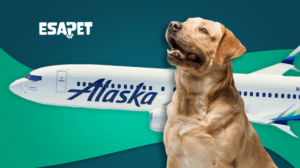Mini Horse Service Animal: What Can It Do for You?

Mini horse service animals offer a unique alternative for dogs. They can help individuals with disabilities, including mental health conditions.
Miniature horses are stable, live long, and can perform specific tasks. Opting for a service miniature horse can boost your independence and improve your quality of life.
This guide highlights the potential benefits and roles mini horse service animals can play in supporting their handlers.
What Is a Service Animal?
A service animal is a dog or miniature horse trained to perform tasks for an individual with a disability. As defined by the Americans with Disabilities Act (ADA), this includes physical, sensory, psychiatric, intellectual, or other mental disabilities,
The tasks vary widely but are directly related to the handler’s disability. Service animals can guide the visually impaired, alert the deaf, or pull wheelchairs.
Some alerts protect a person who is having a seizure. Meanwhile, others remind a person with mental illness to take prescribed medications. They can calm a person with Post Traumatic Stress Disorder (PTSD) during an anxiety attack.
Service animals are distinguished by their ability to perform these specific tasks. As such, they must be permitted to go with their handlers to all public places.
How Does a Miniature Horse Service Animal Work?
A mini horse becomes a service animal through a process that includes selection for temperament. They are trained for obedience and specific tasks to assist people with disabilities.
These tasks are varied and tailored to meet the unique needs of the handler. They can range from guiding those with visual impairments to fetching items.
Service miniature horses must also undergo public access training. This ensures that they can navigate various environments safely and confidently.
Training includes familiarization with different settings, from urban streets to public transportation. It allows them to accompany their handlers virtually anywhere. Their calm nature and ability to focus amid distractions are nurtured during training.
What Can Mini Horse Service Animal Do for You?
Guiding their handler to an exit in an unfamiliar building or location is one of their primary tasks. This task is particularly useful in emergencies or challenging environments. For individuals with visual impairments or spatial orientation difficulties.
Offering support and stability during a dizzy episode is another critical role. The horse’s sturdy build provides a solid base for individuals to lean on. This prevents falls and aids in regaining balance during episodes of instability.
Fetching medication or other coping tools is a task miniature horses can be trained to do. This can be lifesaving in situations where their handler cannot reach their medication. The same goes for items that manage their condition, such as during a medical emergency.
Another common task is providing distraction during a flashback or anxiety episode. The miniature horse’s presence and comforting actions can help ground their handler. This can help reduce the intensity and duration of the episode.
Offering navigation help to a handler with a visual disability is their most recognized role. Mini horse service animals are trained to do that. They can safely lead their handlers around obstacles and through various environments.
Miniature Horse or a Service Dog: Which is the Best?
The choice for a service animal often boils down to a miniature horse vs a service dog. It all depends on the individual’s needs, lifestyle, and preferences. Both animals offer unique benefits, but miniature horses stand out for several reasons:
Longer Lifespan
Miniature horses have a longer-than-average lifespan when compared to dogs. They typically live up to 25-35 years.
This longevity can provide a stable and long-term companionship for individuals with disabilities. It reduces the frequency of training and bonding with new ESAs over their lifetime.
Hypoallergenic Advantage
For individuals with allergies to dogs, miniature horses present a viable alternative. They do not have the same dander as dogs, which is often the cause of allergic reactions.
Exceptional Memory
Miniature horses possess an impressive memory. This allows them to remember complex routes and tasks for extended periods. They are particularly effective as guide animals for individuals with vision-related disabilities.
Strength and Stability
Due to their size and build, miniature horses can offer physical and emotional support animals, something that dogs cannot. They can provide balance and stability for individuals with mobility issues. That makes them a practical choice for those requiring physical assistance.
Intuitive and Social Nature
Miniature horses are known for their intuitive and natural social behavior. They can form deep bonds with their handlers.
They are sensitive to emotional and physical cues. That can be particularly beneficial for therapeutic purposes.
Take Note |
|
Service dogs are incredibly versatile and well-suited to many individuals. However, miniature horses offer unique benefits that may be preferable for certain individuals. The best choice depends on specific needs, environmental factors, and personal preferences. |
How Do You Train a Mini Horse To Become a Service Animal?
Training a mini horse to become a service animal involves a systematic process. It ensures the animal can perform specific tasks for people with disabilities.
The initial step involves basic obedience training. This is where the miniature horse learns to follow simple commands. Think “come,” “stay,” “move forward,” and “turn.”
This foundational stage is crucial for establishing the trainer’s authority. It also ensures the owner’s control and responsiveness to commands.
Beyond basic obedience, the miniature horse undergoes specialized task training. These are tailored to the specific needs of the handler.
A horse meant to guide a visually impaired person would be trained to get through obstacles. It should stop at curbs, and lead the handler safely through various environments.
Socialization is another critical component of training. Miniature horses must become comfortable and calm around various distractions.
These include loud noises, sudden movements, and the presence of other animals. This is achieved through controlled exposure to various environments and situations.
Conditioning the horse to wear any equipment it might need while performing its duties is also a part of the training process. This includes harnesses, boots, or any special gear designed for service horses. They must accept wearing this equipment comfortably and perform its tasks unhindered.
Finally, ongoing training and assessment are vital. It helps maintain and refine the skills of a miniature horse service animal. Regular practice sessions help reinforce learned behaviors and introduce new skills as needed.
Is It Possible for a Miniature Horse To Accompany You in Public?
It is possible for a miniature horse to accompany you in public. This is especially true if the miniature horse’s type serves as a service animal.
For instance, miniature horses have been trained to guide individuals who are blind. They serve as an alternative to guide dogs for those who might be allergic. It is a great choice for people who prefer a horse’s longer lifespan.
However, public access rights for miniature horses differ from those for service dogs. Due to their size and the nature of their care, not all public spaces can accommodate them easily
Nevertheless, many public spaces have welcomed people accompanied by miniature horses. For instance, a miniature horse named Flirty made headlines for flying in the cabin of a commercial airplane. Regulations can vary by location and carrier.
Is Mini Horse Service Animal Right for You?
Deciding to include a service animal in your life is a big step that can impact your daily living and well-being. Miniature horses are well-recognized for their ability to act as service animals.
They primarily serve as guides for individuals with visual impairments. Their long lifespan, calm demeanor, and strong physical build suit this task.
Before considering one as a service animal, consult with a healthcare provider. Such a professional can offer tailored advice based on your specific needs and circumstances. They can potentially recommend a miniature horse as part of your treatment plan.
ESA Pet offers a quick solution for those considering a miniature horse as an Emotional Support Animal (ESA). We understand the unique bond between individuals and their service animals. We are dedicated to facilitating the process of obtaining a legitimate ESA Letter.
This document grants legal recognition to your service animal. This way, it can accompany you in various public settings without issue.
An ESA Letter from ESA Pet validates your need for a service or emotional support animal. It grants your ESA protection under federal law. This includes housing protection in buildings with no-pet policies and access to air travel.
Get your Official ESA Letter Consultation from a licensed therapist.
Get ESA Letter Now
FAQs about Mini Horse Service Animal
Can a Miniature Horse Be Claimed as a Service Animal?
Yes. A miniature horse can indeed be claimed as a service animal. However, some specific regulations and guidelines govern this designation.
According to the ADA, miniature horses are considered service animals under certain conditions. The miniature horse must be trained to perform tasks for an individual with a disability.
Can a Miniature Horse Be a Therapy Animal?
Miniature horses can also serve as therapy animals. However, this role differs significantly from that of a service animal.
Therapy animals provide psychological or physiological therapy to individuals other than their handlers. These animals are often part of structured therapeutic programs. They include settings such as hospitals, schools, and nursing homes.
Can I Bring a Mini Horse on a Plane?
In most cases, no. The U.S. Department of Transportation (DOT) has shifted towards more restrictive policies.
Airlines are no longer required to accommodate miniature horses as service animals. The policy focuses on service dogs as the primary species for air travel.
However, policies can vary between airlines. It’s best to consult with the airline for their specific policies and accommodations.
Take Your Pet with You |
|
We have listed the most pet friendly airlines, that may accommodate your service dog or service mini horse. |
How Much Is a Pet Mini Horse?
The cost of a pet miniature horse can vary widely depending on various factors. Think breed, age, training, and pedigree. Can it serve as a guide horse?
Generally, prices can range from a few hundred dollars to several thousand. Basic costs for pet-quality miniature horses might start around $1,000.
Beyond the initial purchase price, prospective owners should consider ongoing care expenses. These include feeding, housing, veterinary care, and any training needs.
Conclusion
Miniature horse service animals play a big role in helping people with disabilities. They offer unique benefits like a long lifespan, stability, and the ability to perform specific tasks.
These miniature horses provide assistance and companionship. Through obedience training and task-specific skills, they can help people navigate different environments.
For many, these horses represent independence and an improved quality of life. Choosing a mini horse service animal requires considering its size and the type of support it can provide.

Emotional Support Animal, Housing, Travel
How Emma Saved $8,000 Dollars in Pet Fee...
ESA Pet Staff
Sep 6 2023

Dogs, Emotional Support Animal, Travel
Allegiant Airlines Pet Policy – Ev...

Brenda Mejia
May 15 2024


